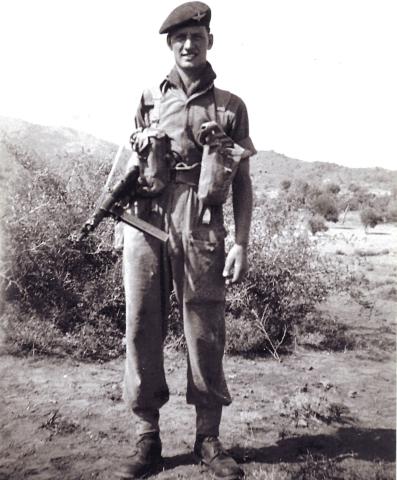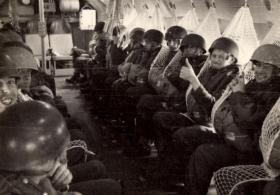Private William Manning Michael Baker ('Bill') was born on March 1, 1932 in Canterbury, Kent to Charles (Charlie) Frank Baker and Kathleen Alice Rennells. His daughter, Pauline, recalls of his early life:
"His dad, Charlie, was hard as nails, and he taught Bill how to fight and got him into boxing. If anyone picked a fight with Charlie, Charlie would tell them to fight his son Bill. As a result, Bill had many fights as a teenager and soon got a reputation for being someone you shouldn’t fight, as Bill would always win. His dad often told him to never be a bully, as bullies are cowards. He also told him to never refuse a fight. Bill never forgot those words, and during his time at school, and in the forces, the weaker males who couldn’t fight would often stay close to him, as they knew that no-one would bully them if they were with Bill.
When Bill was about 14, his dad Charlie picked him up from school and told him he wouldn’t be going back there, but would instead be working, shovelling concrete, to earn some money for the family."
At his father's request, Bill served for a short time in the Royal Navy, enlisting at Chatham and completing 265 days' service. However, he left soon after, as his daughter explains:
"When he was 17, his dad told him to join the Royal Navy, so he did, as he'd never disobey his dad. He stayed in the Royal Navy for 11 months, but he didn't like it. He thought the Petty Officers (Navy's equivalent to NCO) were bullies, who just liked shouting at you and ordering you around for no particular reason, treating you like kids. Bill wasn’t one to be bullied, so he would deliberately wind them up, hoping that they would kick him out of the navy, but they wouldn’t let him leave as he had signed up for 7 years. So Bill kept winding them up. When they were marching on parade, Bill would turn left instead of right. He would deliberately do the wrong thing, hoping that he would get kicked out. It didn’t work though. Instead he was just on continuous punishment, washing dishes every evening, peeling spuds all night, or running around the parade ground with a rifle on his shoulder every morning and evening. It didn’t stop his defiance. He kept winding them up, and eventually it worked. They’d had enough of him and gave him an honourable discharge, on the condition that when he leaves, he joins the army. Bill agreed, and within three weeks of leaving, he had joined the army".
On April 19, 1951 he enlisted into the Army at Shorncliffe and was posted to the Home Counties General Training Centre. He was very briefly posted to the Home Counties Brigade, joining the depot of the Buffs (Royal East Kent Regiment). Shortly thereafter, he transferred to the Airborne Forces Depot, Aldershot. He qualified as a parachutist on course 315 which took place between June 26 and July 17, 1951. After completing 2 descents from a balloon and 6 from a Hastings aircraft, Bill was delighted to receive his parachute wings, as Pauline states:
"He joined The Royal East Kent Regiment (formerly known as the Buff’s), where he stayed for less than a year [about 45 days]. He didn't like it there either. During his first year in the Buff’s, some recruiters for the Parachute Regiment tried to recruit soldiers. Approximately forty men volunteered, the best ten were shortlisted, but less than a handful actually got in! Bill was one of them."
Bill's first overseas assignment was Cyprus. After a brief stop in Egypt, he eventually disembarked in Cyprus on September 25, where he is listed as being part of C Company, 3 PARA. He served there for a month before returning to Egypt on October 17 to help defend the Suez Canal Zone. Baker served in Egypt until June 25, 1952, when he was dispatched to Port Said for embarkation home. Pauline remembers that these were some of his happiest days in the army:
"Bill loved the Parachute regiment! He described the Paras as “real men” and he felt at home amongst them. While in the Paras, he served in the Suez [emergency] which involved serving in Cyprus, Lebanon, and in the Egyptian desert and was still in the desert on his 21st birthday. Bill did 32 jumps in total while in the Parachute regiment"
Bill was now due for release from his full time national service, as he had completed 2 years together with his time in the Navy. Arriving back in the UK on July 10, he was discharged from full time service on August 10. The following day, he was posted to 10 PARA (TA) to complete a period of part time national service. He enlisted into 10 PARA on August 13, 1952 and completed his part-time service on January 29, 1956. During this time, he attended several annual camps and training exercises with the Battalion. He also got married on August 29, 1953, at the age of 21.
Of his time in 3 PARA and then 10 PARA, Bill's daughter remembers that he enjoyed competitive boxing as well as football, where he played centre-half. She adds that he had a reputation as a joker, as the following anecdote suggests:
"His lucky number was 13, as it's a 'Baker's Dozen.' The other Paras never wanted to be the 13th person to jump out of a plane, so they would pay Bill to be the 13th, and Bill would always accept."
After the completion of his service in 10 PARA, Bill was released to the Army General Reserve group 'N' on August 12, 1956. However, Private Baker was called up to a regular army engagement on March 24, 1958, when he re-enlisted at Canterbury full-time into the parachute regiment. It is not mentioned at this time which battalion he served with. He served for 127 days in this engagement until he was returned to the Reserve on July 28, 1958.
Finally, on January 26, 1960, Bill joined 62 (Mixed) Signal Regiment (Cinque Ports), which was based in Shorncliffe - the same place he originally enlisted. He became a TA Signaller and served with the unit during its renaming to 44th (Home Counties) Signal Regiment (Cinque Ports) (the unit's name changed on June 1, 1961). Signaller Baker was discharged from this unit on December 18, 1961. He was part of the General Reserve for two more years, when his liability ran out on February 28, 1964. Nevertheless, Bill was still young, and went on to work in various different roles, which Pauline remembers:
"After leaving the forces, he needed to earn money, so he got a job digging for coal in the mines. He was living in Canterbury at the time, and the mine was in Chislet, which was about 4 miles away. He had to start work at 6am, but couldn’t afford a car at the time, so he would wake up at 4.30am and cycle the four miles to the mine. He’d then have to be lifted down into the pit, where he’d have to walk a further two miles to get to the area he was required to dig coal. He’d work an 8-hour shift, before his long journey home. It was incredibly hard work.
He then joined the Merchant Navy, as a bedroom steward on various cruise ships, and did this for ten years. He loved this, and would work for different cruise lines, including P&O and Cunard, depending on their itinerary. He travelled all over the World, but Fiji was his favourite port. He said the Fijian people were welcoming and friendly, and whenever he arrived at Fiji, he was the first one off the ship and the last one back on".
Bill's first marriage was dissolved around 1970, but he married a second time in 1975. Bill had 4 children from his first marriage, and 2 children from his second marriage. His second marriage was dissolved after 7 years
Bill was not issued his General Service Medal until October 2003 (nearly 50 years after the Suez emergency). Prime Minister Tony Blair announced that veterans of the Suez Emergency – sometimes called the ‘Forgotten army’ - would finally be recognized with a General Service Medal with a Canal Zone clasp. This came about after decades of appeals from veterans' groups. Sadly, Bill never knew about his medal, as he was already 71 in 2003. His daughter claimed it for him, posthumously.
When Bill was in his 70s, he would often say to his daughter Pauline:
“When I die, remember I’ve had a bloody good life.
A hard life, but a good one.
I’ve been up in the air, down in the pit, in two armies and two navies.
Even tried to join the WREN’s, but failed the medical.
I’ve travelled all over the world several times.
Name any ten countries, and I will have been to seven of them.
Not many people have done half the things I’ve done.
Always remember, I’ve had a bloody good life.”
William 'Bill' Baker died on March 25, 2011, at the age of 79.
Created by the Paradata team with information kindly supplied by Pauline Baker.
Read More
















Latest Comments
https://www.youtube.com/watch?v=fLPuEj_W1Rk
Add Comment
In order to add comments you must be registered with ParaData.
If you are currently a ParaData member please login.
If you are not currently a ParaData member but wish to get involved please register.